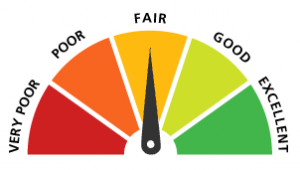Personal Finance
Securing Credit? Importance Of A Personal Financial Statement
Published
5 years agoon

If you, as an individual, are a salaried employee but now wish to start a business, then your personal financial statement will be the key to avail credit. You may not be entitled for a loan for business, as the eligibility criteria here underlines history and financial position of an existing business. Since, the business in question would be a start-up; you will have to depend on personal finances for the time being, as a means to fund the venture. It is however recommended to keep personal and business finances separate, in the long-run.
When providing monetary support to a new business, it is important for the fund-provider to understand your financial position, which is well-represented by your personal finance statement.
What Does a Personal Financial Statement Contain?
A personal financial statement reflects your financial health. It is a spreadsheet or a document that gives a breakdown of all assets, liabilities, and fiscal details.
- This document also contains general information such as your name, address, etc.
- The assets are detailed on the right side, while the liabilities are listed at the left side of the sheet.
- Liabilities include credit card balance, a personal loan, mortgage, unpaid tax, and more.
- Assets include amount of balance in bank accounts, trading accounts, retirement account balances, and similar information.
- If you are married, then you can apply for a joint personal financial statement, which shows details of all debt incurred and owned assets, of both the involved persons.
What is excluded from a Personal Balance Sheet?
There are a few things, which personal financial statements do not show.
- Business-related liabilities and assets do not surface in a personal financial statement.
- This spreadsheet also excludes leases and rentals since the rented or leased assets are not under your ownership.
- A personal balance sheet will exclude personal property such as household goods, furniture, and more, which cannot be sold off to repay a loan.
- However, property that has significant value such as antiques, jewelry, etc, can be included, if the asset value of these items are verified for appraisal by a certified agency.
Analysis of Net Worth, Possibility of Availing Credit, and More
A personal financial statement thus basically shows your net worth, which is assets minus liabilities, and it holds a great value, when it comes to seeking loans.
- Net worth translates as what you will have in cash if you sell off all the self-owned assets to repay debts.
- If the financial statement shows debts as greater than assets, then your net worth will is a negative.
- For instance, if the sum of your utility and credit bills, auto loan bills, mortgage bills, etc. sum up to be more than the cash of all the investments and real estate property you own, then your net worth is negative.
- If the net worth shows as negative, you can file for bankruptcy protection to resolve some of the debts. It may prevent creditors from collecting outstanding debt by posing any financial threat or stress on you.
- However, certain liabilities cannot be discharged, and these include alimony, taxes, child support, and more.
Thus, personal financial statements have a great impact, when it comes to securing funds to run a new business. The document allows banks/NBFCs to assess your financial situation so that they can take an informed credit decision. If your financial health is not up to the expectation, you may be given an option to provide a personal guarantee, pledge an asset, or co-apply for the loan.
How to Fund Your Start-up Business?
You can either apply for a property loan or a soft loan to arrange capital for the venture, or opt for a small cash loan or a short-term loan, until the business attains enough vintage and financial history, to shift to a business loan suited for only business purposes. Thus, by comparing personal financial statements over a time, you can track your financial health and monitor it closely to improve the same. You should keep a check on this document regularly, especially if you intend to avail credit for business needs.
What is a Business Financial Statement?
A financial statement of your company will list liabilities and assets specific to the business alone. It will depict the net worth of the company, and leave out your personal financial details. The financial statements of an organization, include income statements, profit and loss statements, proof of revenue generation over a specific time period, expenses and debts incurred, cash flow statements (indicated the amount of cash the business has), shareholder equity statements (indicate the performance of the company’s stock).
Thus, a personal and business finance statement are different from each other in lot many ways, though they serve the same purpose, which is to denote the financial position of an entity, be it an individual or a company. An organization’s financial statement comes in use when applying for a traditional business loan, which is the best way to finance your start-up initiative, after it attains at least 3-years vintage.
If you wish to secure a loan for your start-up business, do not hesitate to take support of your personal finance for the moment. And to avail monetary support via this route, you need to keep a regular check on your personal financial statement.
This article originally appeared on ValueWalk. Follow ValueWalk on Twitter, Instagram and Facebook.
You may like
-
The Top 10 Investment Opportunities To Capitalize On During A Recession
-
3 Gold Mining Stocks To Buy Today 📲
-
10 Tips for Making More Money with Your Airbnb Listing
-
From Pet Rocks to Potato Parcels: 5 Crazy Ideas That Made Millions Online
-
From Zero to Millionaire: How 9-5 Marketing Guy Made A Fortune Selling Pet Rocks As A Joke (1)
Personal Finance
DIY: Money Management Tips That Will Improve Your Finances
Published
2 years agoon
January 11, 2022
Even if you’re not looking for a property this exact second, you always want to be improving your position.
So, focus on the downtime to improve your finances, get your debt squared away, and put yourself in a better position when you are ready to buy!
It’s important to be sure of your financial position before you buy a property because you might find it’s harder to get that property than you would have originally thought.
Here are some personal finance tips to help you save, pay down more debt, and qualify for better loans.
Pay Attention
One of the most common reasons that people struggle financially is because they simply don’t pay attention to what is going on in their own financial life. If you are not paying attention, you can’t hope to know what is going on and therefore know how to improve matters.
Read these money management tips to start paying attention to your finances.

When I’m working on a project, I’m laser-focused on the budget, the details, the costs, etc. But, sometimes in my personal life, I let this slide.
The reality is, when we do have a budget and focus on sticking to it, our bank account balances grow so much faster than when we aren’t using one.
I love to eat out, and my wife loves to buy small things around the house. One day, we looked back over the previous year of spending and found we each averaged over $1,000 per month on our hobbies!
By pulling back a little in each area, we were able to save over $1,000 per month but still do the things we enjoyed.
So, start by having a budget!
Even if you are financially well off and can afford most of what you want, by budgeting for the items and spreading the costs out over several months, you’ll find that you buy less, spend less, and save more.

Also, if you budget to pay down certain debts faster, you’ll see those balances dramatically drop!
So, do not overlook the importance of a family budget.
Save On Other Purchases
There might be a number of other big purchases you need to make before you get hold of your next property, and it is a good idea to make sure that you are only spending as much on those as absolutely necessary.
For any big ticket items, we actually start searching for them months or even a year in advance. For example, let’s consider kitchen appliances.
As you know, a full set of appliances can easily cost $5,000-$10,000 if you are getting high-end products. It includes a fridge, double oven, gas cooktop, microwave/fan, and dishwasher.
The first thing we did was go to the store and decide on two or three brands, styles and product lines we wanted. It’s hard to compare prices unless you are looking at similar products between stores.
Then, for months we’ll watch these items and their prices. Occasionally there will be sales and by tracking the pricing all year, we know which sales are worth getting or not. When we feel we are getting the best price, we’ll buy.
And by doing that, we can easily save $500-$1,000 or even more.
We did something similar with our TV, computer monitors, etc. Basically, anything that is currently working that we want to upgrade. Over the course of a year, we are saving thousands of dollars.
You might also use a money saving app to help.
Saving money in all these places will make an enormous difference when it comes to saving for your next down-payment
Pay Down Debt
With all the money you are saving by budgeting and by planning out major purchases, you might want to use some of it to pay down debt.
You’ll have to decide if it’s better to pay down debt or have a larger down payment because both will hold you back on your next purchase.

But, generally, paying down $1/month in debt is worth about $3/month in income. At least, as far as loans are concerned.
If you do decide to work on paying down your debt, I fully detail a unique debt pay down method to get you into your next rental property faster.
Increase Your Income
Most people just focus on debt, but the reality is you can only cut your expenses so much.
Income, on the other hand, has unlimited potential. So, why not focus on growing your income?
Increasing your monthly income can be done in a number of passive and active ways, and it is worth looking into as many of these as you can to find the right one for you. I outline a number of ways to increase your income in this article on how to earn $10,000 per month.
While earning $10,000 per month in side-income might seem a long way off, it’s important to start! Even if you can earn an extra $500 month now, and grow it slowly over time, it’s worth it!.
Don’t Focus on Just One Thing
As I mentioned already, focusing on just budgeting, or debt paydown can be detrimental to your overall financial goals. It’s important to combine a number of different things into an overall strategy, which includes budgeting, debt paydown, and increasing your income.
To know more about real estate hack, money tips, and building generational wealth, subscribe to Wealthlab and learn how to bust through the barriers preventing you from becoming a millionaire.
This article originally appeared on IdealREI. Follow them on Facebook, Instagram and Twitter.
Personal Finance
VIDEO: 3 Things You MUST Know About Your Credit Score
Published
3 years agoon
October 18, 2021
We all know what a credit score is. Sort of. But what really goes into your credit score? In this video, Investopedia breaks it down. Here are the top 3 factors that affect your credit score — and what you can do about it.

If financial difficulties are keeping you awake at night, take action and tackle your problems head on otherwise they are likely to get worse. The ability to pay for rent, mortgages, bills, and food are fundamental to our quality of life.
It is important to plan for future financial hardship by making saving a goal and budgeting carefully. It’s impossible to predict what will happen in the future, so to cushion any financial hardship, it’s worth putting a little money aside each month.
Developing a savings plan now will enable you to get on with living your life stress-free! Here are the financial tips to start building your wealth.
Reduce monthly bills
List all your current outgoings and look to see if you can make any savings. Often it’s tempting to keep the same standing order from the same insurance company for year upon year. You are likely to be paying too much for your premiums and it’s worth shopping around and switching.
Look at the amount of interest you are paying on loans, mortgages and credit cards, you could be able to secure a better deal. One thing to remember is to check your credit score if it is poor lenders won’t give you the best interest rate.

It is possible to repair your credit score by using the expertise of a credit repair company.
Utility bills can be reduced by switching utility providers. Use an online comparison site to secure the best deal. Switching is easy as most of the work is completed for you by your new supplier.
Budget
To budget carefully you need to be in control of your spending and to be in control you need to be aware of your income and outgoings. List every necessary outgoing that must be met on a monthly basis and you will be left with an amount which will have been spent on miscellaneous items such as eating out.
You can then design a budget plan so that you can put a certain amount into a savings account. You will probably be surprised at how much your morning coffee costs when added up over the month.
Cut it down to once or twice a week and you will make significant savings.
Make savings work to your advantage
Savings (if you have them!) can work to your financial advantage. Ensure you choose the best financial products that give the maximum return on your savings. Financial products change rapidly to factor in a financial audit of your savings every couple of years to check savings are in the best account.
You could also consider investing your savings property or financial shares. This has the potential to be lucrative but is not without risk. Consider hiring a professional and independent financial advisor for advice.

Ideally, you should set apart some of your salaries each month in order to build up an emergency fund. Life can be unpredictable and without savings to fall back on, your car breaking down or your roof leaking could plunge you into more debt as you borrow to rectify the situation.
Savings will cushion the blow of any financial hardship.
Stop Paying Extra Bank or Late Fees
Late fees are not helping you. They add up over time – fees can even accrue fees!
If you are the kind of person who always forgets to pay their bills on time, you can get around this by automating your finances so that the money automatically goes out of your account.
You should also avoid making any extra charges on your credit card unless you are sure that you are able to pay it off in full at the end of the month.
Don’t Pay Full Price!
Paying full price is a really common financial mistake that a ton of people make.
In today’s world, you can find a sale on just about any item. If you see something you need at the store, take a few moments to shop for it online and you’ll probably be able to save 10-20%
Not only does this method stop you from overpaying, it also gives you a moment to think and decide whether or not what you were thinking of buying is actually a worthwhile investment.
Create a Financial Defense Plan
All of us need to not only earn our living and grow our finances if we’re to live a comfortable and happy life, but we must also defend them.
That means ensuring you stay rational, sensible and forward-thinking in all matters related to your financial health.
There are a few considerations you can take care of in order to make this so, and generate a cognitive and systemic financial defense to keep your money yours, and flowing in the direction you most want.
Here are the keys to defending your financial interests
Know Good Lawyers
The most important thing is to have good counsel and good advice. So, hire the best attorneys that you can afford. From real estate to contracts to brand protection, you need someone behind you making sure you aren’t making any major missteps.
The world practically runs in the courtroom now, unfortunately. So, with good attorneys on your side, it will keep you out of the courtroom and focused on running your business.
Have A Contingency Plan
It’s always best to have a fail-safe.
This might mean never tying up all your investments in one basket. It might mean diversifying your investments .
Or, it could mean allowing only one or two financial handlers to have any kind of insight into your money matters in the first place.

The key is to be able to have a solid plan but also be able to pivot to something else should the first plan fail.
With the willingness to keep a backup plan, or a mode of operation to take when something fails or doesn’t go the way you expect, you at least won’t lose anything.
Keeping a solid contingency is also reliant on keeping solid discipline with your financial means – without this none of your decisions are likely to land effectively.
Pore Over Contracts
Whenever signing a contract, or forging a new one, you need to know exactly what terms are referring to.
You also need to read between the lines, and consider what situations a certain stipulation could affect in the future. Remember, even vaguely written terms in a contract do not fall there unexpectedly.
They are either there to make or defend a certain form of income, or persuade and dissuade a certain type of behavior. Every word counts.
Remember the first recommendation? Well, here’s where they come in. But, it’s important to know how to read and interpret the contracts yourself as well.
Study contract terminology and simply dedicate the time to observe and understand.
Look For Weak Spots
What are the weak spots in your defense system?
Could it be family members having access to your accounts? Do you think it could it be emotional family members asking for financial help, when this is not genuine?
Or perhaps it could it be the services you bank with.
Don’t forget about the way you log in to your accounts and store passwords.
To prevent your finances from being breached, keep up to date on modern security measures. From there, you should be settled.
Conclusion
To reduce your financial stress, the key is to lower your costs, increase your passive income, and protect your assets.
To know more about real estate hack, money tips, and building generational wealth, subscribe to Wealthlab and learn how to bust through the barriers preventing you from becoming a millionaire.
This article originally appeared on IdealREI. Follow them on Facebook, Instagram and Twitter.
Top 5 Best Investment Strategies To Survive A Recession
The Top 10 Investment Opportunities To Capitalize On During A Recession
3 Gold Mining Stocks To Buy Today 📲
Ad 1
Trending

You’ve reached your free article limit.
Continue reading by subscribing.
Already a subsciber? Login >
Go back to Homepage >





You must be logged in to post a comment Login